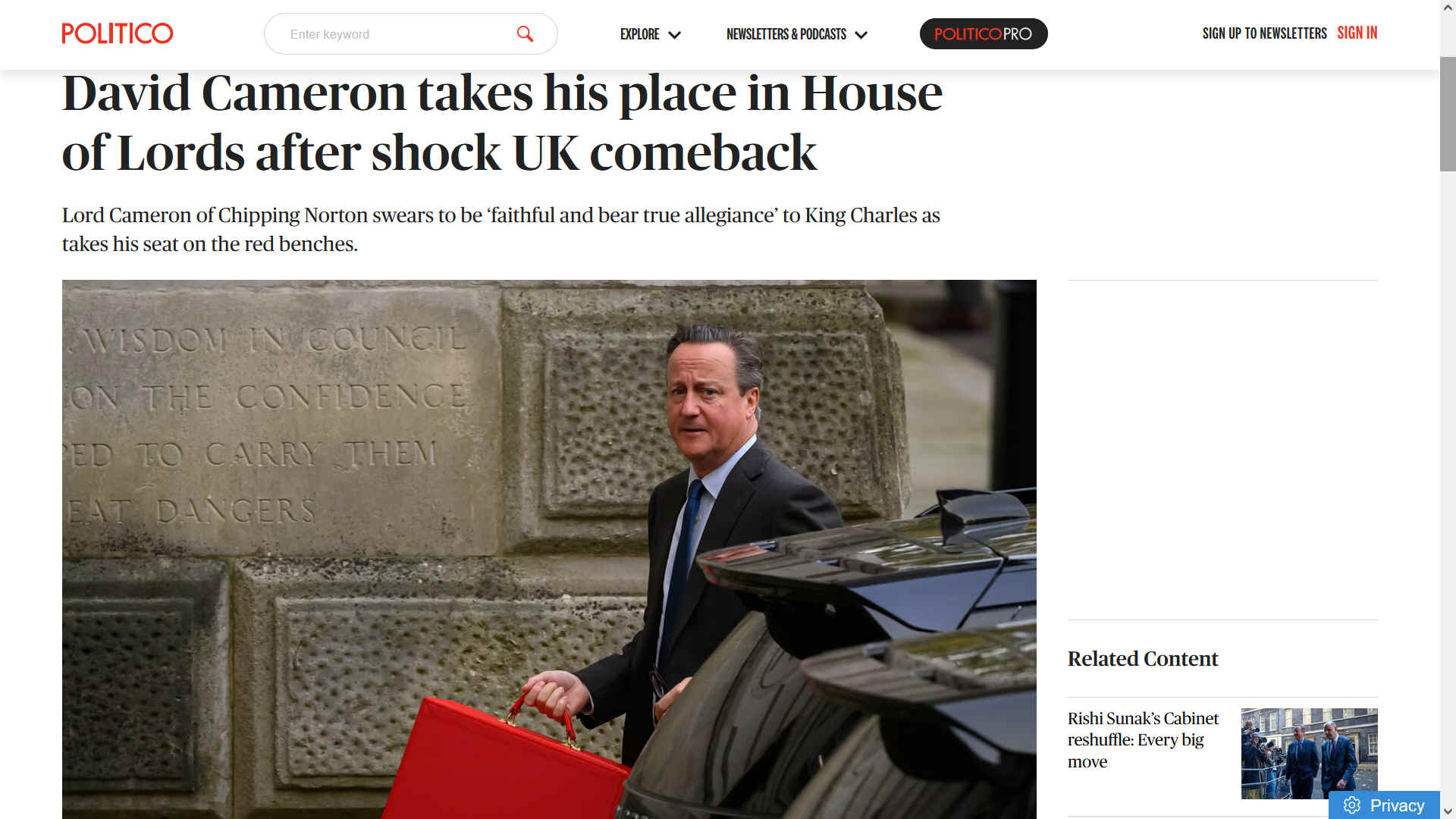
OH
SHIT DAVID! - "Yes
Sire, when I was Prime Minister, I really screwed up, setting up
Brexit, with a bunch of clowns to follow in the farce that
followed. Still ongoing, and yes, with a National Debt to scare
the hell out of any new candidates, who understand Ponzi
Politics. Britain is going downhill at an alarming rate. How
long the Monarchy will last at this rate, who knows. But at
least we got rid on that embarrassing bloke with haystack hair."
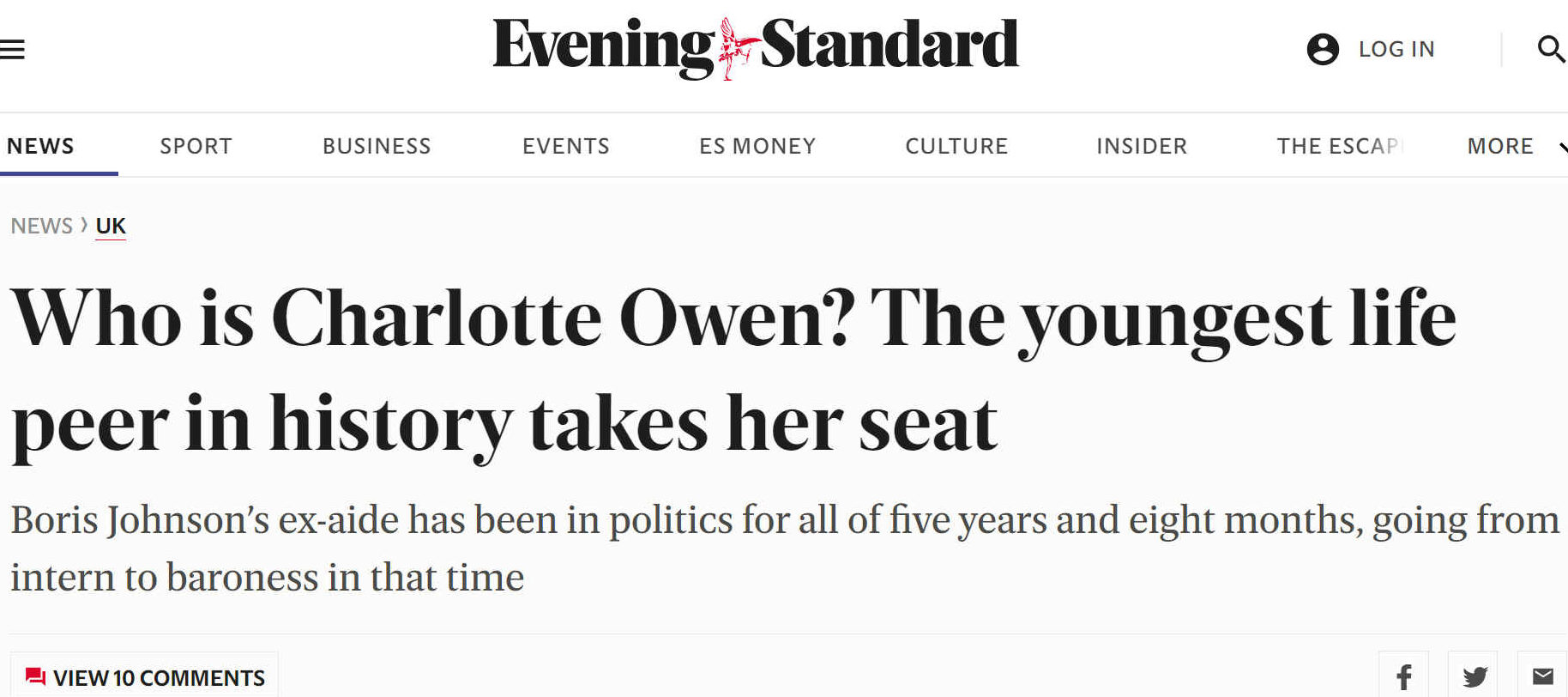
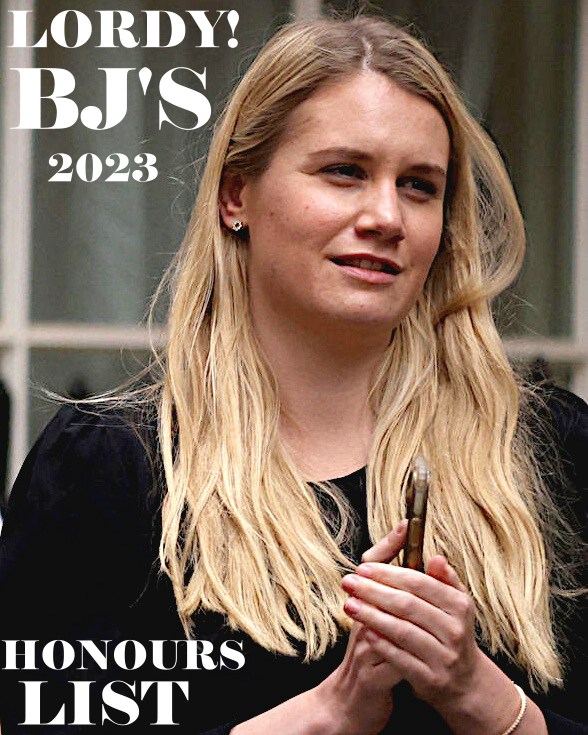
The
Baroness of Alderley Edge & BJ's honours list?
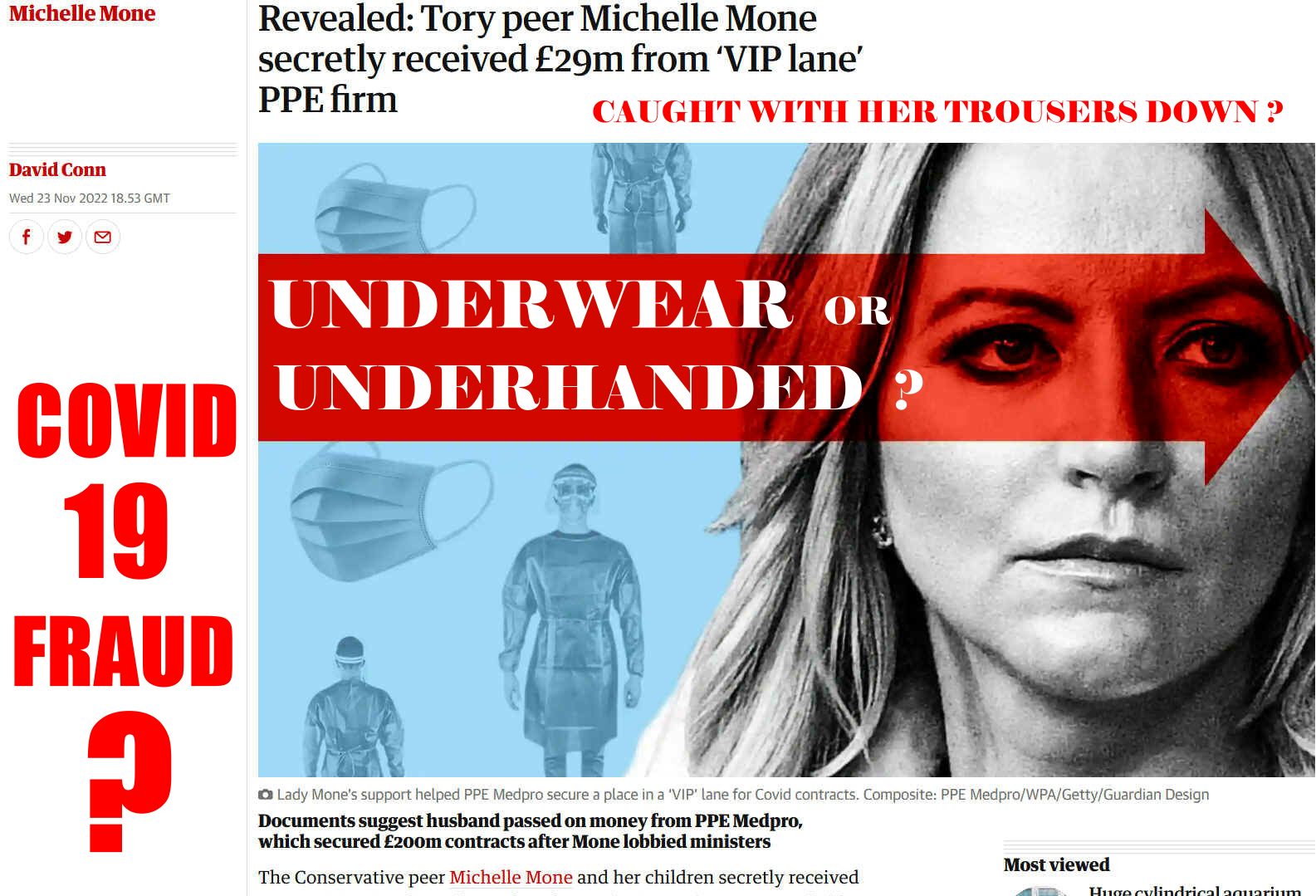
DEMOCRATIC CORRUPTION
It
is well reported in the media, that appointments and titles may
be effectively bought for cash donations to political parties.
So, perpetuating returns of the parties most inclined to be
swayed, as a virtual bribe system.
The
other issue is hereditary titles. How can it be that in a
so-called democracy, you can inherit a title, with no
qualifications, then vote on the making and passing of laws? It
is total lunacy
to suggest that a good legal brain and a grasp of the issues of
the day, is passed down to your children. A democracy demands
that those who make laws are elected based on their skills for
the job. Hence, the system appears to be corrupt from the
outset, and an abuse of process.
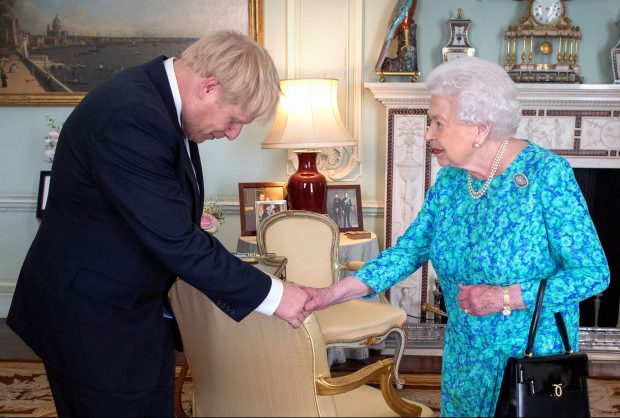
OH
SHIT BORIS! - "Yes
Maam, got my well used pecker caught in the zipper again. Not quite as
big a fiasco as Charles and Meghan's treatment though. "I guess the royals have
been rumbled" "Not to worry, with plenty of media brain washing from the BBC and other
media too frightened to tell it like it is - and we may come through this
- and even make a few more bucks, in case we ever need to defend
ourselves in a court of law."
The House of
Lords, also known as the House of Peers, is the upper house of the Parliament of the United Kingdom. Membership is by appointment, heredity or official function. Like the House of Commons, it meets in the Palace of Westminster in London, England.
The House of Lords scrutinises bills that have been approved by the House of Commons. It regularly reviews and amends bills from the Commons. While it is unable to prevent bills passing into law, except in certain limited circumstances, it can delay bills and force the Commons to reconsider their decisions. In this capacity, the House of Lords acts as a check on the more powerful House of Commons that is independent of the electoral process. While members of the Lords may also take on roles as government ministers, high-ranking officials such as cabinet ministers are usually drawn from the Commons. The House of Lords does not control the term of the prime minister or of the government. Only the lower house may force the prime minister to resign or call elections.
While the House of Commons has a defined number of members, the number of members in the House of Lords is not fixed. Currently, it has 786 sitting members. The House of Lords is the only upper house of any bicameral parliament in the world to be larger than its lower house, and is the second-largest legislative chamber in the world behind the Chinese National People's Congress.
The King's Speech is delivered in the House of Lords during the State Opening of Parliament. In addition to its role as the upper house, until the establishment of the Supreme Court in 2009, the House of Lords, through the Law Lords, acted as the final court of appeal in the United Kingdom judicial system. The House of Lords also has a Church of England role, in that Church Measures must be tabled within the House by the Lords Spiritual.
In 2019, a seven-month enquiry by Naomi Ellenbogen QC found that one in five staff of the House had experienced bullying or harassment which they did not report for fear of reprisals. This was preceded by several cases, including Liberal Democrat Anthony Lester, Lord Lester of Herne Hill, of Lords using their position to sexually harass or abuse women.
REFORM OF THE HOUSE OF LORDS
Certain governments in the United Kingdom have, for more than a century, attempted to find a way to reform the House of Lords, the upper house of the Parliament of the United Kingdom. This process was started by the Parliament Act 1911 introduced by the then Liberal Government which stated:
"...whereas it is intended to substitute for the House of Lords as it at present exists a Second Chamber constituted on a popular instead of hereditary basis, but such substitution cannot be immediately brought into operation."
When the Labour Party came to power in the 1997 general election, it had in its manifesto the promise to reform the House of Lords:
The House of Lords must be reformed. As an initial, self-contained reform, not dependent on further reform in the future, the right of hereditary Peers to sit and vote in the House of Lords will be ended by statute...
numerous debates in Parliament and the media. However, no consensus on the future of the upper chamber emerged.
All three of the main parties promised to take action on Lords reform in the 2010 general election, and following it the Coalition Agreement included a promise to "establish a committee to bring forward proposals for a wholly or mainly elected upper chamber on the basis of proportional representation". Deputy Prime Minister Nick Clegg introduced the House of Lords Reform Bill 2012 on 27 June 2012 which built on proposals published on 17 May 2011. However, this Bill was abandoned by the Government on 6 August 2012 following opposition from within the Conservative Party. A successful attempt to pursue minor reform of the House was made on 14 May 2014 when the House of Lords Reform Act 2014 gained Royal Assent.
HISTORY OF REFORM
SUPREME COURT
On 24 March 2005, the Constitutional Reform Act 2005 received Royal Assent. It provides for replacement of the Appellate Committee of the House of Lords with a Supreme Court. It came into force on 1 October 2009, when the new court started work. Most of the Law Lords became its first justices, but retained their peerages. A peerage is no longer required to sit in the UK's court of last resort.
2006 DISCUSSIONS
In March 2006, the House of Lords reform was again under discussion. This new interest resulted from the Cash for Peerages affair together with recent attempts by the Lords to block, water down, or add safeguards to (according to viewpoint) recent controversial legislation such as the Anti-terrorism, Crime and Security Act 2001, Hunting Act 2004, Terrorism Act 2006, the Identity Cards Act 2006, and the Racial and Religious Hatred Act 2006. Following the failure of the previous public consultations, to endorse the Government's proposals for reform, in April 2006, Baroness Amos announced the government would now "consult privately" with the other main political parties on the membership of the House.
In the Cabinet reshuffle on 5 May 2006, governmental responsibility for this topic was transferred from Lord Falconer, both Secretary of State for Constitutional Affairs and Lord Chancellor), to the Leader of the House of Commons, Jack Straw.
Jack Straw now faced an enormous challenge. Although seen as very modest reforms, the removal of most Hereditary Peers and rebalancing of the political make up of the House (Labour Peers now formed the largest political party) were making the House increasingly confident of its own legitimacy. Paradoxically, far from making the Lords more submissive, more and more the House of Lords was willing to be assertive in its actions and confront the government.
On 22 January 2007 the Power Inquiry launched a campaign for greater citizen involvement and provided statistics showing that 68% of the public felt a jury of the general public should decide "the future of the House of Lords", 17% thought elected politicians should decide and 9% appointed civil servants.
2007 WHITE PAPER
On 8 February 2007, the Government published a new white paper following discussions of a cross-party working group convened by Jack Straw, Leader of the House of Commons. The consensus position adopted by the paper called for a House composed of elected members and members appointed by a new Statutory Appointments Commission. The new Commission would select non-party-political appointees; party-political appointees would be nominated by party leaders in the House of Commons and vetted by the Commission.
Any elected element would be elected under a regional list system. All elections and appointments would take place on a five-year cycle, with one third of the House admitted at each intake to a fixed fifteen-year term; this term would be non-renewable, to ensure members' independence. A further measure would prohibit former members of the reformed House from seeking election to the House of Commons before a minimum amount of time had elapsed after the expiry of their term in the reformed House – the Government suggested five years. The aim of this measure was to prevent aspiring politicians from using the reformed House as a base to launch a Parliamentary career. The Government proposed that elections and appointments should be held on the same day as elections for Britain's Members of the European Parliament – which also take place on a fixed five-year cycle.
Whilst the white paper made recommendations for a half-elected, half-appointed House, it proposed a free vote of MPs among seven options as to composition (see below). The white paper also recommended that at least 20% of members be non-party-political appointees: for example, under the white paper's proposal of a 50–50 split between elected and appointed members, the remaining 30% appointed members would be party political; under the 80%–20% elected/appointed option, there would be no party-political appointees. The 20% non-party-political element would include a reduced number of Church of England bishops, whose appointment would not go through the Statutory Appointments Commission. The total size of the House was proposed to be 540 members – with 180 introduced at each intake.
The paper provided for a gradual transition, with no life peers forced to retire before death, but with the possibility of a redundancy package should they choose to do so. The remaining hereditary peers would be removed, but the white paper left open whether they would be removed at one stroke or allowed a gradual removal by "natural wastage". The link between the peerage and membership of the House would be broken: peerages could still potentially be awarded as an honour, but would neither entail nor follow automatically from a seat in the House. The question of a possible new name for the reformed House was left open.
The white paper also proposed avoiding the risk of all options being rejected, as had occurred in the 2003 debate, by using the alternative vote system (also known as instant-runoff voting). Using the alternative vote for legislative proposals would have been a new precedent for the UK Parliament. Resistance by Members on all sides of the House of Commons caused Leader of the House of Commons Jack Straw to drop this proposal on 19 February. The free vote was therefore held under traditional Parliamentary procedures.
VOTES OF MARCH 2007
In March 2007 the Houses of Commons and Lords debated the proposals in the 2007 white paper and voted on a similar series of motions to those voted on in 2003. Unexpectedly, the House of Commons voted by a large majority for an all-elected Upper House. One week later, the House of Lords retorted by voting for an all-appointed House by a larger majority.
After the Commons vote, it was speculated by political commentators that some MPs supporting a fully appointed House had voted tactically for a fully elected House as the option likely to be least acceptable to the House of Lords. This called into question the significance of the larger majority achieved for 100% elected than that achieved for 80% elected. However, examination of the names of MPs voting at each division in the Commons shows that, of the 305 who voted for the 80% elected option, 211 went on to vote for the 100% elected option. Given that this vote took place after the vote on 80% – whose result was already known when the vote on 100% took place – this shows a clear preference in the Commons for a fully elected Upper House over the only other option that passed, since any MP who favoured 80% over 100% would have voted against the latter motion, having already secured their preferred outcome (76 MPs – including Jack Straw, his shadow Theresa May and Opposition Leader David Cameron – did exactly that). Had all the votes been held in the contrary order, those 211 would have voted against the 80% motion, which would consequently have fallen.
HOUSE OF LORDS REFORM BILL 2012
The bill, introduced by Nick Clegg, was given its first reading on 27 June 2012. On 9 July 2012, the bill began to be debated. The Government also tried to introduce a programme motion, which would have limited the amount of time available to debate the bill. Labour called for more scrutiny of the bill and said it would vote against the programme motion, along with several Conservative MPs. On 10 July 2012, it became clear that the Government was going to lose the vote on the programme motion and it was withdrawn. At the vote that evening on whether to give the bill a second reading, 91 Conservative MPs voted against the three line whip, while 19 more abstained. On 6 August 2012, Deputy Prime Minister Nick Clegg announced that the Government was abandoning the bill due to the opposition from Conservative backbench MPs, claiming that the Conservatives had "broken the coalition contract". However, David Cameron disputed this view, saying that the agreement contained no specific promise to enact reform of the House of Lords.
HOUSE OF LORDS REFORM ACT 2014
The House of Lords Reform Act 2014 allowed members to resign from the House; previously there was no mechanism for this. It also allowed for the (non-retrospective) exclusion of any peer convicted of a criminal offence and sentenced to a term of imprisonment of one year or more.
LORDS SPIRITUAL (WOMEN) ACT 2015
The Lords Spiritual (Women) Act 2015 regulates the procedure for women bishops to enter the House of Lords as Lords Spiritual. It stipulates that if a vacancy arises among the Lords Spiritual during the decade after the passing of the act, this vacancy is to be filled by a female bishop (if there are any eligible). This followed the Bishops and Priests (Consecration and Ordination of Women) Measure 2014, whereby the Church of England first recognised female bishops.
HOUSE OF LORDS (EXPULSION AND SUSPENSION) ACT 2015
The House of Lords (Expulsion and Suspension) Act 2015 authorised the House to expel or suspend members.
REASONS FOR REFORM
There are several criticisms of the House of Lords, including:
- The appointments process, which has often been described as undemocratic. The current process means the House of Lords remains fully unelected and allows peers to hold their seats until death.
- The makeup of the Lords does not reflect the social and demographic diversity of the UK, with under-representation of ethnic minorities and women when compared with the House of Commons, and relative over-representation of people from South East England and people over 50.
- The House of Lords is often criticised for being too large, and thus too expensive. With almost 800 members it is the second-largest legislative house in the world, second only to the National People's Congress of China, and is much larger than Upper Houses in comparable countries.
These criticisms have led some to question whether there is a need for a second house at all, and whether the bicameral system in British politics is still useful.
ABOLITION
Many legislatures, such as the parliaments of Norway, Portugal, Denmark, Israel and New Zealand (and within the UK, the Scottish Parliament, the Senedd and the Northern Ireland Assembly) are unicameral and thus do not have an upper house. Instead, scrutiny is carried out by parliamentary committees. A minority of MPs voted for the outright abolition of the upper house in 2003, and it was Labour party policy until the late 1980s. One of the most well known MPs to advocate the abolition of the House of Lords was Tony Benn. In January 2020, during the 2020 Labour Party leadership election, candidate Rebecca Long-Bailey announced her support for abolishing the House of Lords. The Scottish National Party (SNP) favours abolition, and as such has no members of the House of Lords. In November 2022, Sir Keir Starmer stated that if elected, the Labour Party would abolish the House of Lords and replace it with an elected house.
[Presumably banning those with links to slave
trading, like David
Cameron and Jeremy Hunt, allegedly]
Many countries have directly elected Upper Chambers but they try to make their electoral systems for the second chamber as distinct as possible from the first chamber by holding elections on a different cycle or electing only a proportion of members on each occasion. Politicians such as Tony Benn maintained that elections are necessary to be democratic, stating, "Democracy means an elected second chamber", however Tony Benn later advocated for the abolition of the House of Lords.
According to the Government report, the advantages of an elected Upper House are:
- Legitimacy: There can be no doubt about the democratic mandate of a freely elected body.
-
Status of members: Membership of the second chamber would be seen as a job with specific and important duties attached.
-
Representation: All parts of the country and all shades of political opinion could be represented.
-
Age: An elected House is likely to have more younger people in it than a nominated one and therefore be more reflective of society.
-
Entrenched bicameralism: It is an unequivocal sign the Government was committed to a bicameral legislature.
A hereditary right passing down the generations was argued as promoting a divided society between the upper classes and the lower classes. Moreover, in practice, the hereditary peers had a natural bias on certain issues, such as a socially conservative outlook and unwillingness to support liberal and socialist legislation. (In the events which led to the original legislation to reduce their power, the House of Lords were opposed to the People's Budget, which did not serve their interests, as it was built to help the middle and lower classes, while taxing land owners and the "idle rich", promising wealth redistribution.
PEOPLE'S BUDGET
The 1909/1910 People's Budget was a proposal of the Liberal government that introduced unprecedented taxes on the lands and incomes of Britain's wealthy to fund new social welfare programmes. It passed the House of Commons in 1909 but was blocked by the House of Lords for a year and became law in April 1910.
It was championed by the Chancellor of the Exchequer, David Lloyd George, and his young ally Winston Churchill, who was then President of the Board of Trade and a fellow Liberal; called the "Terrible Twins" by certain Conservative contemporaries.
William Manchester, one of Churchill's biographers, called the People's Budget a "revolutionary concept" because it was the first budget in British history with the expressed intent of redistributing wealth equally amongst the British population. It was a key issue of contention between the Liberal government and the Conservative-dominated House of Lords, leading to two general elections in 1910 and the enactment of the Parliament Act 1911.
The Budget was introduced in the British Parliament by David Lloyd George on 29 April 1909. Lloyd George argued that the People's Budget would eliminate poverty, and commended it thus:
"This is a war Budget. It is for raising money to wage implacable warfare against poverty and squalidness. I cannot help hoping and believing that before this generation has passed away, we shall have advanced a great step towards that good time, when poverty, and the wretchedness and human degradation which always follows in its camp, will be as remote to the people of this country as the wolves which once infested its forests."
The budget included several proposed tax increases to fund the Liberal welfare reforms. Income tax was held at nine pence in the pound (9d, or 3.75%) on incomes less than £2,000, which was equivalent to roughly £225,000 in today's money — but a higher rate of one shilling (12d, or 5%) was proposed on incomes greater than £2,000, and an additional surcharge or supertax of 6d (a further 2.5%) was proposed on the amount by which incomes of £5,000, or more (approximately £566,000 today) exceeded £3,000 (£340,000 today approx.). An increase was also proposed in death duties and naval rearmament.
More controversially, the Budget also included a proposal for the introduction of complete land valuation and a 20% tax on increases in value when land changed hands. Land taxes were based on the ideas of the American tax reformer Henry George. This would have had a major effect on large landowners, and the Conservative-Unionist opposition, many of whom were large landowners, had had an overwhelming majority in the Lords since the Liberal split in 1886. Furthermore, the Conservatives believed that money should be raised through the introduction of tariffs on imports, which would benefit British industry and trade within the Empire, and raise revenue for social reforms at the same time; but this was also unpopular as it would have meant higher prices on imported food. According to economic theory, such tariffs would have been very beneficial for landowners, especially tariffs on
agricultural produce, but the costs to ordinary consumers would have exceeded the gains to these landowners.
HENRY GEORGE - GEORGISM
Henry George (September 2, 1839 – October 29, 1897) was an American political economist and journalist. His writing was immensely popular in 19th-century America and sparked several reform movements of the Progressive Era. He inspired the economic philosophy known as Georgism, the belief that people should own the value they produce themselves, but that the economic value of land (including natural resources) should belong equally to all members of society. George famously argued that a single tax on land values would create a more productive and just society.
His most famous work, Progress and Poverty (1879), sold millions of copies worldwide. The treatise investigates the paradox of increasing inequality and poverty amid economic and technological progress, the business cycle with its cyclic nature of industrialized economies, and the use of rent capture such as land value tax and other anti-monopoly reforms as a remedy for these and other social problems.
One day in 1871 George went for a horseback ride and stopped to rest while overlooking San Francisco Bay. He later wrote of the revelation that he had:
"I asked a passing teamster, for want of something better to say, what land was worth there. He pointed to some cows grazing so far off that they looked like mice, and said, "I don't know exactly, but there is a man over there who will sell some land for a thousand dollars an acre." Like a flash it came over me that there was the reason of advancing poverty with advancing wealth. With the growth of population, land grows in value, and the men who work it must pay more for the privilege."
George made the argument that a sizeable portion of the wealth created by social and technological advances in a free market economy is possessed by land owners and monopolists via economic rents, and that this concentration of unearned wealth is the main cause of poverty. George considered it a great injustice that private profit was being earned from restricting access to natural resources while productive activity was burdened with heavy taxes, and indicated that such a system was equivalent to slavery – a concept somewhat similar to wage slavery. This is also the work in which he made the case for a land value tax in which governments would tax the value of the land itself, thus preventing private interests from profiting upon its mere possession, but allowing the value of all improvements made to that land to remain with investors.
FINANCIAL SLAVERY - WAGE LABOURERS
The view that working for wages is akin to slavery dates back to the ancient world. In ancient Rome, Cicero wrote that "the very wage [wage labourers] receive is a pledge of their slavery".
In 1763, the French journalist Simon Linguet published an influential description of wage slavery:
The slave was precious to his master because of the money he had cost him ... They were worth at least as much as they could be sold for in the market ... It is the impossibility of living by any other means that compels our farm labourers to till the soil whose fruits they will not eat and our masons to construct buildings in which they will not live ... It is want that compels them to go down on their knees to the rich man in order to get from him permission to enrich him ... what effective gain [has] the suppression of slavery brought [him ?] He is free, you say. Ah! That is his misfortune ... These men ... [have] the most terrible, the most imperious of masters, that is, need. ... They must therefore find someone to hire them, or die of hunger. Is that to be free?
The view that wage work has substantial similarities with chattel slavery was actively put forward in the late 18th and 19th centuries by defenders of chattel slavery (most notably in the Southern states of the United States) and by opponents of capitalism (who were also critics of chattel slavery). Some defenders of slavery, mainly from the Southern slave states, argued that Northern workers were "free but in name – the slaves of endless toil" and that their slaves were better off. This contention has been partly corroborated by some modern studies that indicate slaves' material conditions in the 19th century were "better than what was typically available to free urban laborers at the time". In this period, Henry David Thoreau wrote that "[i]t is hard to have a Southern overseer; it is worse to have a Northern one; but worst of all when you are the slave-driver of yourself."
CORRUPTION ENSLAVES WORKERS MORE AS ADDITIONAL TOIL TO KEEP FRAUDSTERS WEALTHY
Clearly, where corruption is rife in politics, that corruption is a form of taxation, that is a form of slavery.
Remove the corruption, and the wealthy are deprived of the mechanism by which they profit on the sweat of the ordinary working man.
Corruption is giving a vote to a person with a vested interest, who will always vote to protect his property, or monopoly position. The vote will follow the money.
Corruption is allowing titles to be bought, such that they are in a position to vote for their money.
The likes of Boris Johnson are well schooled in advantaging their wealthy chums, in the process raking off a nice percentage for themselves, for towing the party line. The Party Line being to keep the enslaved, in slave conditions.
THE NATIONAL DEBT & BORROWING
Borrowing to maintain the illusion that all is well, is in effect, pushing additional tax burdens on those least able to afford it. Hence,
further enslaving of the workforce. And that situation being beyond their control. Since, understanding a budget, is typically beyond the average worker, as well those from Eton, Oxford or Cambridge - are taught - and know full well how to press home to good advantage.

WHY
CONTACT THE HOUSE OF LORDS
Don't bother with the Lords
They
like the present system
And there's nothing you can do about it
through them
So
there !!!
Or
is there?
Telephone: 0800 223 0855 (Freephone) or 020 7219 3107
Email: hlinfo@parliament.uk
LINKS
& REFERENCE
https://www.theguardian.com/




